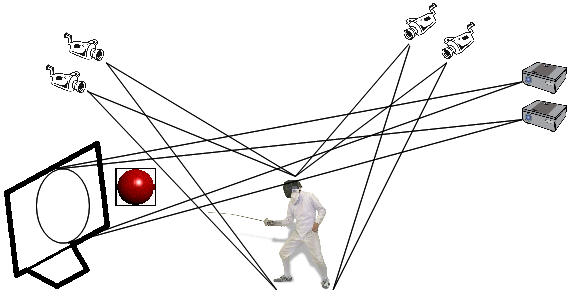
Friedrich-Alexander-Universität Erlangen
Lehrstuhl für Mustererkennung
Martensstraße 3
91058 Erlangen

The performance of human vision is an important issue in every day life. It is not only limited by properties of the eye and its components as the visual system extends into the brain. Vision perception is processed in different retinal and cortical channels including spatial contrast, spatial orientation, texture, motion, binocular disparity (3D vision), and color. It was shown in the past, that these channels can be trained by specific stimulation improving the visual performance, e.g. in presbyopia which is an age-related impairement for near-vision. For athletes perceptual learning and improvement of e.g. 3D vision results into lower reaction times and higher precision in their actions.
The project's goal is to train the 3D vision channel of fencers to improve their athletic performance. Therefore, 3D simulations of virtual objects are presented to the athletes. Their actions and reactions on the objects are tracked by high speed cameras to produce data for their velocity and precision, i.e. their performance. Medical partners analyze the data for information about 3D vision performance that can be used for improvement. The final goal is the implementation of a fully automated virtual system improving the 3D vision of fencers by continously virtual training.

Example for a virtual setup for perceptual training of 3D vision. A 3D simulation of an object is presented to a fencer via stereo projection. The fencer is tracked by four cameras.